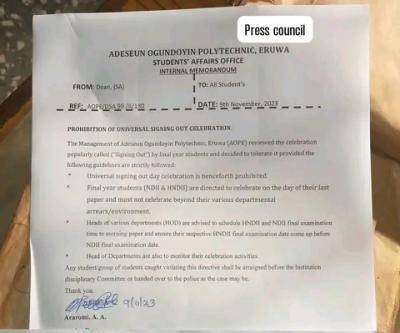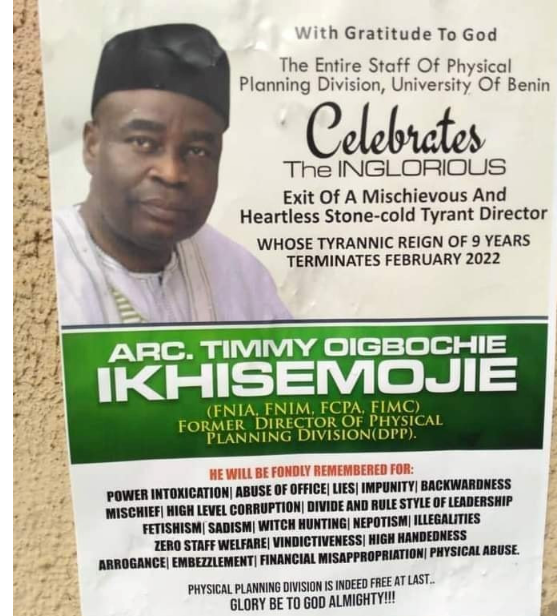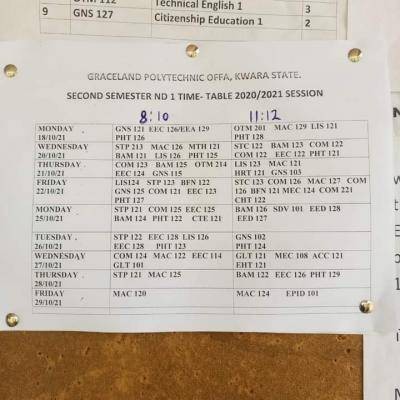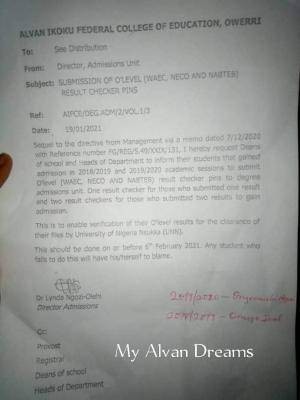
How Candidates, Mercenaries Beat UTME Examiners:
In spite of promises by the organizers of this year JAMB that measures have been put in place to checkmate cheating, the candidates still perfected strategies to beat the examiners to the game by engaging in all sorts of examination malpractices.
Some of the strategies adopted by the candidates included the use of mobile handsets to transmit results, buying of questions papers on the eve of the examination and sorting of examiners right there in the halls.
Education Review investigations revealed that most of these candidates, in collaboration with some of their parents, friends and undergraduates, spent hundreds of thousands of naira to perfect their arrangements since most of them want to beat the cut-off point by all means. But unlike last year, it was observed that almost all the centres used for the examination had fences round about them thereby making it difficult for mercenaries and candidates to move in and out as freely as they can. It was learnt that as early as 8:00am, all the gates were securely locked and candidates frisked with metal detectors to prevent them from smuggling in some handsets as well as dangerous weapons into the halls.
But the fast candidates were said to have arranged with some mercenaries who later smuggled in the handsets. When our correspondent visited some examination centres within Calabar metropolis, it was discovered that there were high level of malpractices going on and this was not without the knowledge of the invigilators who allegedly had been bought over by desperate candidates.
At St Patrick College, Ikot Ansa, Margaret Ekpo International Secondary School, Akim Secondary School, University of Calabar Centres (all in Calabar Municipality), Science Secondary School, Mayn Avenue, Edgerly Memorial Girls’ Secondary School (all in Calabar South) mercenaries, made up of candidates’ relations and even parents, were seen patrolling around the exam centres and looking for possible avenues to send in their “ekpo” meaning, ready-made answers, across to their candidates in the halls. Further findings revealed that these “ekpo” answers (a.k.a family support) were sent in through mobile handsets even when examiners had barred its use in the examination halls.
While some of the candidates, in connivance with invigilators, still smuggled it in and were allowed access to it; others were openly dictating the answers to their “clients” (candidates) just as a few with guts came outside with security men ostensibly to relieve themselves and collected the “bullet” and dashed back into the hall. Within these centres also, different types of flashy cars, some with government registration numbers and hired commercial taxis, were parked outside from which parents/guardians waiting for their wards, monitored how the “business of the day” was going on.
The recharge cards sellers were not left out of the business boom as these mercenaries were busy loading their mobile handsets and desperately making calls to ensure they get across to the clients or relations as the case may be. A lady, who simply gave her name as Imma, told our correspondent that she came out to assist the daughter scale through because she does not want her to stay idle again in the house. The dark-complexioned lady said: “I decided to come out and ensure that my daughter gets the answers right because we had already made arrangements with some examiners. And I am happy it is going on well.”
On how she felt being part of this kind of illegal arrangement, she said, “Is there anybody that does not engage in exam malpractice? Ministers, politicians, academics, traders, workers and even market women all give money in different forms just to ensure that their wards scale through in school. So, I am not the only one. I am bold doing it because I don’t have long legs after here.”
Another parent, who identified himself as Okon (surname withheld), said: “I came here to help my son. I want him to go to university by all means and be a big man in future. So do not ask me further question.” One of the examiners, who refused to disclose his name, said “what is happening these days is terrible. These parents just came in here and have been pestering us. Some are threatening to deal with us if we fail to cooperate while a few understanding ones have been begging that we should assist take the ‘ekpo’ to their wards in the hall.”
However, just as some candidates beamed with smiles during the exams, a good number of them had some tales of woes to tell following the failure of the digital machines deployed by Joint Admissions and Matriculation Board, (JAMB) to curb examination malpractices, to thumb print and to capture the images of thousands of candidates in Calabar metropolis.
Checks by Education Review revealed that the operators and supervisors at some centres including University of Calabar, Cross River State University and government technical school, Mayne Avenue, all in Calabar complained that either candidates’ hands were too dirty for the machines to capture their data or that there was something wrong with the machines. Sensing that, the operators advised the candidates to look for clean water or sachet water to wash their hands and see if the machines can capture their thumbprints and images.
This development led to the mad rush for sachet water by the candidates, their relatives who came with them to the examination venue and even passers-by who were commissioned to bring in some trucks of sachet water. The examiners complained that even with the interim measures applied, the accreditation process, which started at about 8am, in some centres across the metropolis was very slow as some of the thumb-printing machines were less hyper sensitive to facilitate the procedure.
Checks revealed that following the failure of the machines, the candidates were allowed to go in and write the examination through manual processes with a promise by the invigilators to take up their cases to JAMB authorities. Some of the candidates, who expressed reservations with such alternative arrangements, feared that their results may not be released as the examination body is very strict this time with thumb printing of fingers and image capturing of candidates, at least to curb some of the irregularities.
Speaking shortly after the examination, one of the candidates, Essien Ita, 24, said he was disappointed over the delay and wondered why they should use such sub-standard machines for such an important national examination. Essien said: “I arrived at my centre as early as 6 am because my house is very far from this place but unfortunately during the accreditation process my thumb-print could not appear on the machine. The officials used methylated spirits to wipe my fingers but to no avail, I was even advised to buy sachet water to wash my hands but all of that could not work. It was later they collected my data and allowed me to sit for the examination as they promised that it would be sorted out later.
“I feel very disappointed because this is my fourth time of writing this exam, and I am really optimistic that this would be the last time I am sitting for the exam.” He appealed to JAMB to look into their case.
Another candidate who gave her name as Jennifer recounted her ordeal: “It would be very painful for the board to take the thumb-printing thing seriously because most of us our thumbs are too soft and moist and this prevents our images from appearing on the machine; let them do something urgently about this so that our result can be released simultaneously with our colleagues.” While the candidates complained, the sachet water hawkers smiled to the banks as most of them made fortunes running into thousands of naira within a space of two hours.
One of the hawkers, who spoke to our correspondents, admitted that it has been long she made this kind of profit and thanked JAMB for giving her this day. The hawker, who identified herself as Nkoyo said, “Today is good for sure. I am happy, my mother will be happy because I have sold sachet water worth about N15, 000, an amount I have not been able to make at a go for some months now except when big ceremony is in town. JAMB has helped us.”
Another sachet water hawker, Blessing Okon 15, said: “it was a day of making brisk money and it was exceptional from other days. We thank God for what he has done for us.” When Education Review visited the JAMB office along Mariam Road, Calabar Municipality, at about 12 noon, the examination team leader of the Calabar Metropolis, Mrs. Ann Aijolokharai Momoh, was said to be away on the field to monitor things. But when she was contacted later on phone, she said: “I have no authority to talk about the exams.” (Sun News)




